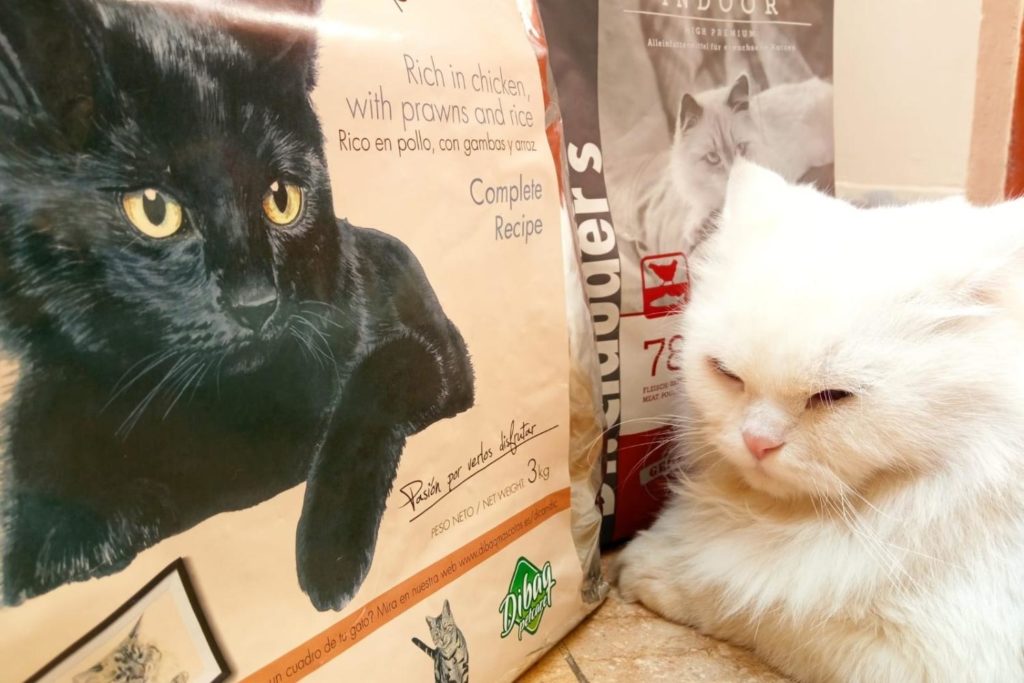
In reality, a cat should not be without food for longer than a few hours. However, considering how resilient cats are, they can remain without solid food for a while.
How Long Can a Cat Go without Food?
Cats can go without solid food for 1 – 2 weeks. But this is only possible if they have a water supply to fall back on. Without food or water, cats can only stay alive for 3 – 4 days.
You may wonder if this remains true for all cats, feral and domesticated.
Feral cats are more used to being without food for longer hours, so hunger doesn’t affect them as immediately and terribly as you think. But for a domesticated cat who receives food regularly several times a day, it’s not a good idea to keep them without food for long.
As a cat owner, it’s your responsibility to make sure your cat eats appropriately. But, if you’re wondering why your cat is not eating even when presented with food, that’s a whole other ball game.
Cats will often voluntarily choose not to eat and will go a full day or two without eating. This typically happens when your cat isn’t feeling well.
The best hard cat food is also said to be good for a kitty’s teeth. It has an abrasive texture that can safely scrub away any buildup of plaque or tartar.
Why Won’t My Cat Eat Food?
If your cat isn’t eating food, you’ll want to start by checking the food you have.
Cats like variety with food. If you’ve been feeding your cat the same food for the past week or month, you can bet they’ll turn their nose up at the bowl. Buy several different types of cat food or experiment with dry and wet food. The chances are that your cat will eat something else.
But, if your cat still turns away from every type of food you offer, you’ll want to consider its health next.
Health Issues that Affect Cat Hunger
1. Illnesses
Check for the following symptoms:
- Lethargy
- Listlessness
- Increased sleep
- Mood swings
- Vomiting
- Diarrhea
- Fever
- Excessive grooming
- Lack of grooming
Cats usually do not show any signs if they’re feeling unwell, but their body shows enough symptoms to notify you of their ill-health. If your cat is not feeling well, it will show the symptoms mentioned above and isn’t eating at all; this necessitates a visit to the vet.
Considering that these symptoms may be a sign of something more serious, taking your cat to the vet now will allow you to catch whatever the illness is in due time.
2. Dental Issues
About 50 to 90 percent of cats experience some dental disease. If your cat is older than four years of age, this also doesn’t help matters.
As the owner, it falls on you to check your cat’s dental health regularly. If your cat winces when they eat or drink or do not like eating a particular type of food (e.g., dry food), this is a sign that they may have inflamed gums or a sore tooth.
Keep in mind, these dental problems are pretty painful, so if your cat shows signs of pain or chews from one side or won’t let you touch their mouth or head, take them to the vet for a thorough checkup.
3. Upset Stomach
Aside from food, cats do sometimes ingest things they shouldn’t, like leaves, dust, feathers, or bugs. If their stomach doesn’t agree, that causes an upset stomach.
If your cat has been having trouble using the litter box or has vomited, don’t expect it to eat straight away. Please wait for a few hours and try again with something their stomach won’t reject, like bone broth or boiled chicken.
While their nausea, light-headedness, and vomiting usually do go away within a day, if your cat continues not to eat food by the second day, this requires a visit to the vet. It’s typically nothing serious, but you never know.
4. Medication
Like human medicine, medication for felines also has side effects. One of those side effects can be loss of appetite. Whenever your cat receives any medication, you must ask whether your cat will experience anything wrong.
If loss of appetite is listed, this will give you comfort in knowing that they’re not sick.
5. Stress
Have you recently moved houses? Has your family brought in someone new to your household?
Cats do not like change. If something happens that they haven’t consented to, they are upset enough that they will stop eating. If your cat continues to behave normally but does not eat. Give it some time, and try to keep fresh food near them during the day.
Stressful events cause cats to stop eating sometimes; it will take some time to return to normal.
What Do I Do If My Cat Doesn’t Eat?
All living creatures need food and water to live. If your cat continues not to eat, it may need medical assistance. In many cases, lack of food and protein can lead to hepatic lipidosis, a liver condition.
Unlike humans whose livers can support them, cats’ livers cannot. If they stay hungry and thirsty for long, their organs will begin to shut down.
How Do I Get My Cat to Eat Food?
If you’ve taken your cat to the vet, you might likely know now precisely why your cat isn’t eating. They may also be receiving medical attention, which might help with their food intake.
Alongside, gradually introducing your cat to their favorite food may help them eat and regain the energy they’ve lost over the past few days. Start with something small like bone broth and small portions of wet food.
Mix both to make a paste and feed them food by either a spoon or placing the bowl in front of them.
The name of the game is patience. If you feed your cat food three times a day and snacks once or twice a day, stick to that schedule but don’t ply them with lots of food.
Use small portions of tuna or chicken, and make sure there are no bones, additions, flavorings, or oil.
Added flavors and ingredients may trigger your cat’s nausea.
If your cat begins eating, that’s great. But, if your cat still doesn’t eat or begins to lose weight, take them to the vet. Your cat may need some intravenous fluids and saline for added energy.
You need to store your dry cat food in a proper way so it does not stale. You also can make wet cat food out of dry so you can provide moist food to your feline.
Conclusion
Cats are typically ravenous creatures, even if you feed them properly.
Not eating is against their nature, so be cautious when they stop. Contrarily, if your cat does not stop eating, no matter how much food you give them, that’s also a sign of an illness, so take them to the doctor as needed.
Your cat’s diet keeps them healthy and strong. As their owner, make it your responsibility to make sure your cat finishes everything on their plate.
